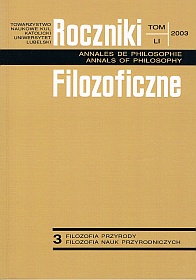Chrześcijański naturalizm
Abstrakt
The moment a notion becomes fashionable its meaning becomes unclear. This also concerns the notion of `naturalism'. After reminding briefly of the evolution of the notion, some of the sources are discussed of contemporary naturalistic tendencies in philosophy of science and current interpretations of scientific theories. One of the characteristic features of contemporary naturalism is a strong tendency to monistic interpretations. This seems to be in drastic opposition to metaphysical and theological dualism connected with the Christian view of the world. But does this view really force this kind of dualism on it followers? The article presents various contemporary views of this problem with a particular stress on the discussion that has been going on around the question of “God's action in the world”. During these polemics the notions of bottom-up causality and top-down causality have been broadly discussed. The author of the article suggests a certain philosophical hypothesis that allows overcoming the controversy between monism and dualism making by that very fact contemporary naturalistic tendencies not objectionable for followers of the Christian view of the world.
Bibliografia
Arystoteles: Fizyka. Tł. K. Leśniak. Warszawa: PWN 1968.
Carroll W. E.: Creation and Science. W: Science and the Future of Mankind. Vatican City 2000 s. 333-349. Pontificiae Academiae Scientiarum Scripta Varia. Vol. 99.
Drees W. B.: Religion, Science and Naturalism. Cambridge−New York: Cambridge University Press 1996.
Ellis G. F. R.: Extraordinary Divine Action: The Nexus of Interaction. W: Chaos and Complexity. Ed. R. J. Russell, N. Murphy, A. Peacocke. Vatican City State−Berkeley: Vatican Observatory Publications, The Center for Theology and the Natural Sciences 1995 s.359-395.
Heller M.: Co to jest matematyka? „Zagadnienia Filozoficzne w Nauce” 28-29:2001 s.71-83.
Heller M., LianaZ., Mączka J.: Nauki przyrodnicze a teologia: Konflikt i współistnienie. Kraków−Tarnów: OBI, Biblos 2001.
Lorentz K.: Nature and Culture – Obsolete Distinction. W: Changing Concepts of Nature at the Turn of the Millennium. Vatican City 1998 s.211-222. Pontificiae Academiae Scientiarum Scripta Varia. Vol. 95.
Mittelstass J.: Historical and Epistemological Aspects of the Concept of Nature. Tamże s.3-19.
Murphy N.: Divine Action in the Natural Order: Buridan's Ass and Schrödinger's Cat. W: Chaos and Complexity s. 325-357.
Peacocke A. R.: God's Interaction with the World: The Implications of Deterministic „Chaos” and Interconnected and Interdependent Complexity. Tamże s. 263-287.
Polkinghorne J.: The Metaphysics of Divine Action. Tamże s. 147-156.
Pollard W. G.: Chance and Providence: God's Action in the World Governed by Scientific Laws. London: Faber and Faber 1958.
Runggaldie r E.: Il naturalismo filosofico contemporaneo e le sue implicazioni antropologiche. „La Civilità Cattolica” 152:2001 n. 3626 s.137-150.
Russell R. J., Murphy N., Meyering T. C., Arbib M. A. (Eds.): Neuroscience and the Person. Vatican City State−Berkeley: Vatican Observatory Publications, The Center for Theology and the Natural Sciences 1999.
Russell R. J., Murphy N., Peacocke A. (Eds.): Chaos and Complexity. Vatican City State−Berkeley: Vatican Observatory Publications, The Center for Theology and the Natural Sciences 1995.
RussellR. J., Stoeger W. R., Ayala F. J. (Eds.): Evolutionary and Molecular Biology. Vatican City State−Berkeley: Vatican Observatory Publications, The Center for Theology and the Natural Sciences 1998.
Saunders N.: Does God Cheat at Dice? Divine Action and Quantum Possibilities. „Zygon” 35:2000 s.517-544.
Tracy T. F.: Particular Providence and the God of Gaps. W: Chaos and Complexity s.289-324.
Wolters G.: Evolving Concepts of Nature. W: Changing Concepts of Nature at the Turn of the Millennium s. 169-182.
Życiński J.: The Laws of Nature and the Immanence of God in the Evolving Universe. „Studies in Science and Theology” 5:1997 s.3-19.
Copyright (c) 2003 Roczniki Filozoficzne

Utwór dostępny jest na licencji Creative Commons Uznanie autorstwa – Użycie niekomercyjne – Bez utworów zależnych 4.0 Międzynarodowe.





